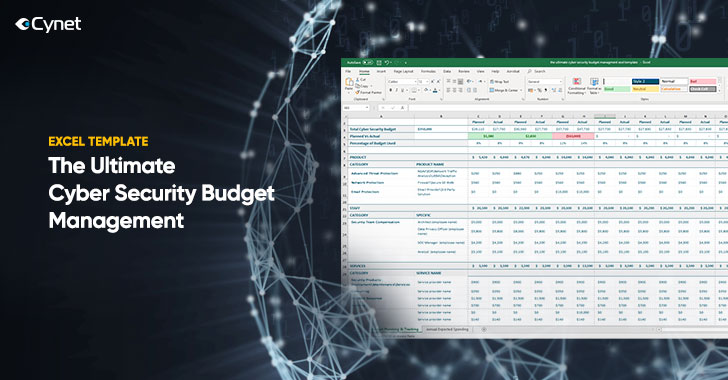Sound security budget planning and execution are essential for CIO's/CISO's success.
Now, for the first time, the Ultimate Security Budget Plan and Track Excel template (download here) provide security executives a clear and intuitive tool to keep track of planned vs. actual spend, ensuring that security needs are addressed while maintaining the budgetary frame.
The dynamic nature of the threat landscape and the possibility of the organization being subject to a critical attack, make an unexpected investment in additional products, staff, or services a highly likely scenario that should be considered. Integrating this factor within the initial planning is a challenge for many CISOs encounters.
The Ultimate Security Budget Plan & Track template is an excel spreadsheet that comes pre-packaged with the required formulas to continuously measure, every month, the planned and actual security investments, providing immediate visibility into any mismatch between the two.
In addition, for each month, there is a summary, displaying the percentage of how much of the overall annual budget has already been consumed.
The Ultimate Security Budget Plan & Track Excel divides security spending into three buckets:
Naturally, there is no one size fits all, and while the template is pre-populated with common products, staff, and services categories with examples, it is meant to be used as a starting point from which each CISO can make modifications and adjustments based on their organization's unique needs.
In order to get started, the following steps are required:
Download The Ultimate Security Budget Plan and Track here.
Now, for the first time, the Ultimate Security Budget Plan and Track Excel template (download here) provide security executives a clear and intuitive tool to keep track of planned vs. actual spend, ensuring that security needs are addressed while maintaining the budgetary frame.
The dynamic nature of the threat landscape and the possibility of the organization being subject to a critical attack, make an unexpected investment in additional products, staff, or services a highly likely scenario that should be considered. Integrating this factor within the initial planning is a challenge for many CISOs encounters.
The Ultimate Security Budget Plan & Track template is an excel spreadsheet that comes pre-packaged with the required formulas to continuously measure, every month, the planned and actual security investments, providing immediate visibility into any mismatch between the two.
In addition, for each month, there is a summary, displaying the percentage of how much of the overall annual budget has already been consumed.
The Ultimate Security Budget Plan & Track Excel divides security spending into three buckets:
- Products – already deployed as well as planned projects for the coming year
- Staff - ongoing retainment of the security team, investments in their professional development, and security training to the organization's workforce
- Services – any type of 3rd party services, from product deployment and management to IR and auditing.
Naturally, there is no one size fits all, and while the template is pre-populated with common products, staff, and services categories with examples, it is meant to be used as a starting point from which each CISO can make modifications and adjustments based on their organization's unique needs.
In order to get started, the following steps are required:
- Insert the annual cybersecurity budget in the dedicated cell
- Go through the three spend sections and add the names of the products, staff, and services you use (feel free to modify these sections based on your needs)
- Enter your planned spending for every month
- At the end of every month, enter your actual spending. If it exceeds the planned one, the cell should become red.
- At the end of each month, get clear visibility into your expected annual spent (actual spend so far + planned spent until the end of the year) vs. The annual allocated budget.
Download The Ultimate Security Budget Plan and Track here.
Have something to say about this article? Comment below or share it with us on Facebook, Twitter or our LinkedIn Group.

